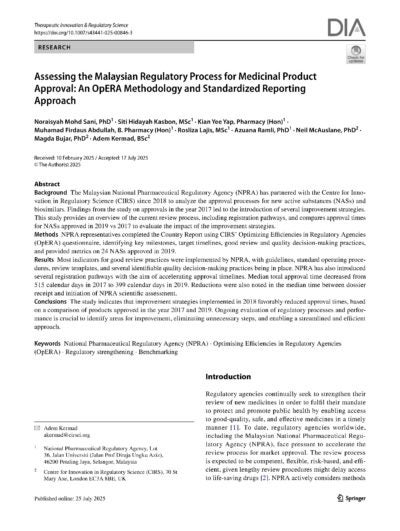Background: The Malaysian National Pharmaceutical Regulatory Agency (NPRA) has partnered with the Centre for Innovation in Regulatory Science (CIRS) since 2018 to analyze the approval processes for new active substances (NASs) and biosimilars. Findings from the study on approvals in the year 2017 led to the introduction of several improvement strategies. This study provides an overview of the current review process, including registration pathways, and compares approval times for NASs approved in 2019 vs 2017 to evaluate the impact of the improvement strategies.
Methods: NPRA representatives completed the Country Report using CIRS’ Optimizing Efficiencies in Regulatory Agencies (OpERA) questionnaire, identifying key milestones, target timelines, good review and quality decision-making practices, and provided metrics on 24 NASs approved in 2019.
Results: Most indicators for good review practices were implemented by NPRA, with guidelines, standard operating procedures, review templates, and several identifiable quality decision-making practices being in place. NPRA has also introduced several registration pathways with the aim of accelerating approval timelines. Median total approval time decreased from 515 calendar days in 2017 to 399 calendar days in 2019. Reductions were also noted in the median time between dossier receipt and initiation of NPRA scientific assessment.
Conclusions: The study indicates that improvement strategies implemented in 2018 favorably reduced approval times, based on a comparison of products approved in the year 2017 and 2019. Ongoing evaluation of regulatory processes and performance is crucial to identify areas for improvement, eliminating unnecessary steps, and enabling a streamlined and efficient approach.
Mohd Sani, N., Kasbon, S.H., Yap, K.Y. et al. Assessing the Malaysian Regulatory Process for Medicinal Product Approval: An OpERA Methodology and Standardized Reporting Approach. Ther Innov Regul Sci (2025). https://doi.org/10.1007/s43441-025-00846-3

